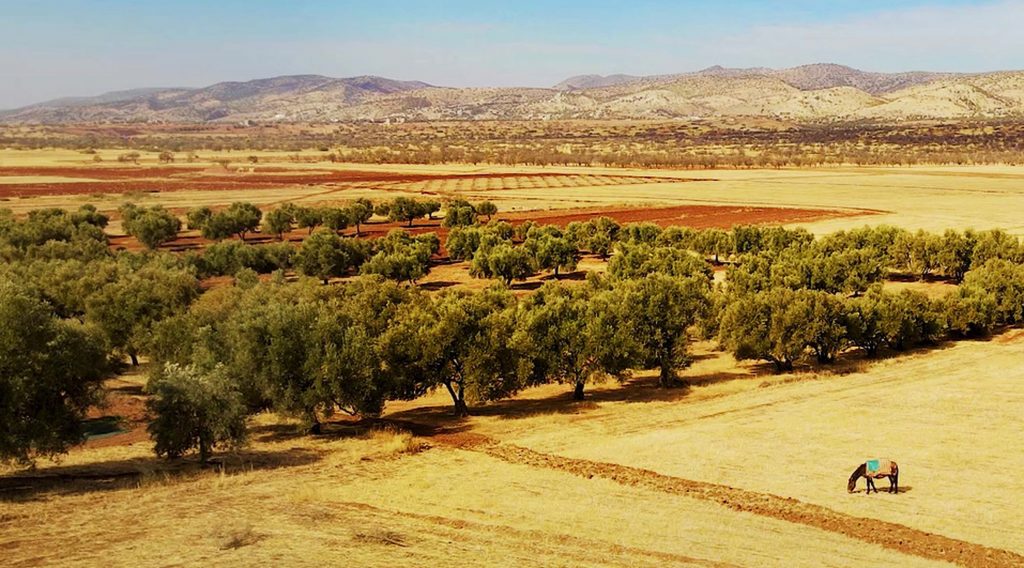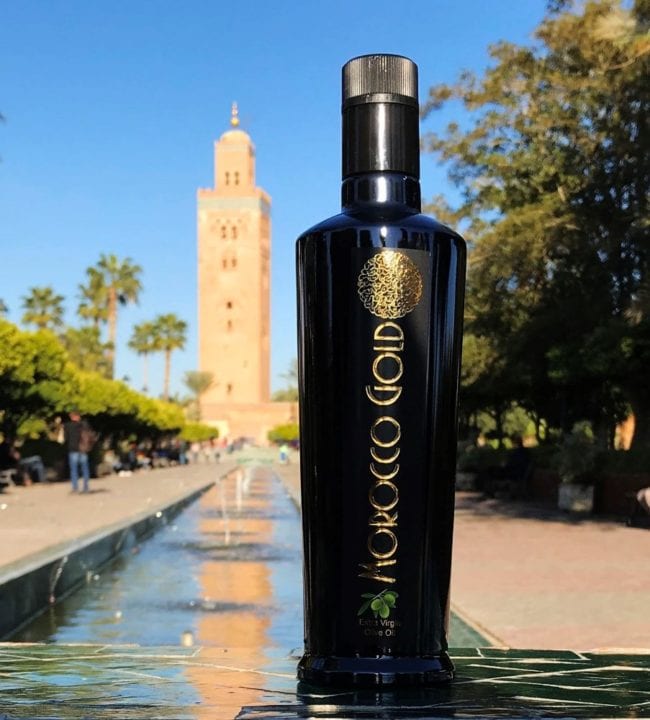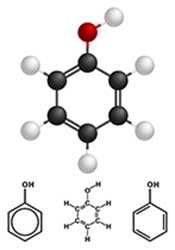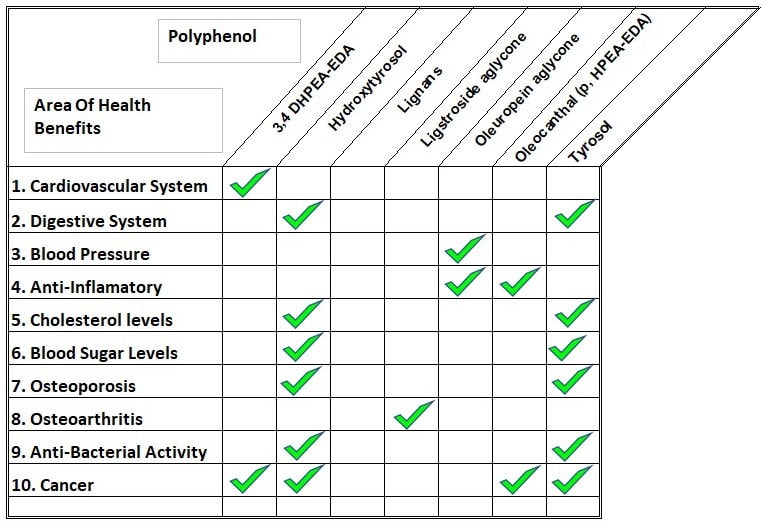What makes Morocco Gold Extra Virgin Olive Oil So Special?
Updated September 9th 2025

Summary
- Extra virgin olive oil, is high in monounsaturated fat, the healthy-for-you kind of fat.
- The biggest thing that makes extra virgin olive oil so healthy is its unique disease-fighting component – polyphenols. The amount of polyphenols found in extra virgin olive oil is truly amazing!
- Polyphenols are powerful antioxidants that combat damage by oxygen free radicals, most often termed oxidative stress, that can lead to various forms of chronic illness.
- Morocco Gold extra virgin olive oil is high in polyphenols
- New research confirms that polyphenols found in extra virgin olive oil survive temperature and do not disappear when the oil is used for cooking
Contents
Polyphenols In Extra Virgin Olive Oil
There are many reasons why people choose extra virgin olive oil like Morocco Gold over other oils. Whether you enjoy extra virgin olive as part of a healthy diet, for its flavour, or because of its well-documented health benefits, this is an oil backed by science. In fact, extra virgin olive oil is one of the most extensively researched foods in the world, with strong evidence for its role in supporting overall health. Choosing a high polyphenol olive oil from reputable producers ensures you enjoy the maximum benefits in both taste and nutrition.
Polyphenols are central to these benefits, helping to explain why extra virgin olive oil is so closely associated with heart health, reduced inflammation and Mediterranean diet research.
Explore more in our Polyphenols Hub.
What Makes Extra Virgin Olive Oil So Healthy?
While other oils such as sunflower and canola contain monounsaturated fats, extra virgin olive oil stands apart because of its unique natural compounds. The main reason this oil is recognised as so healthy is its rich content of olive oil polyphenols. These powerful antioxidants provide anti inflammatory properties and protective effects that go beyond the benefits of fatty acids alone. When you add extra virgin to your diet, you’re making a choice proven to support long-term wellness.
To understand more about how extra virgin olive oil supports overall wellbeing, explore our dedicated Health Benefits resources.

The global interest in the Mediterranean diet has led to an explosion of research into the potential health benefits of olive oil consumption. Clinical studies confirm that the polyphenol content in virgin olive oil plays a key role in reducing oxidative damage, improving cardiovascular health, and lowering the risk of chronic diseases such as heart disease. By choosing a higher polyphenol content oil, you benefit from more concentrated antioxidant properties that help to protect your body against chronic inflammation.
What Are Polyphenols?

Polyphenols in extra virgin olive oil belong to a family of more than 500 natural micronutrients found in plants. These phenolic compounds not only give plants their colour but also help defend them from harm. When you consume oils rich in these polyphenol compounds, you experience their beneficial effects too. From reducing oxidative damage to supporting cardiovascular disease prevention, the antioxidant polyphenols in quality virgin olive give you a clear reason to choose oils with a high concentration of these nutrients.
If you’d like to dive deeper into how we achieve high polyphenol levels specifically in Morocco Gold, explore our guide to polyphenols in Morocco Gold extra virgin olive oil.
Polyphenols in Extra Virgin Olive Oil
Polyphenols: Powerful Antioxidants
Polyphenols in extra virgin olive oil are among the most important natural compounds found in the oil. They are recognised as one of the strongest contributors to its health benefits, making virgin olive oil far more than a cooking ingredient. If you are looking for an oil with genuine protective effects, a higher polyphenol content is what sets premium products apart.
Many of the fruits and vegetables you eat contain polyphenol compounds and other powerful antioxidants. These natural polyphenols support your body by fighting oxidative stress and promoting overall health. Olive oil polyphenols are especially valuable because they combine easily with fats, improving absorption and maximising their beneficial effects. Choosing a high concentration oil such as Morocco Gold means you are investing in your long-term wellbeing.
Why Are Antioxidants So Important?
Oxidation is a normal process in your cells as they generate energy from the oxygen you breathe. Yet as energy is produced, unstable oxygen molecules called free radicals also form. In high amounts, these free radicals damage cells and DNA. Ongoing oxidative stress has been linked to many diseases such as:
- Certain cancer cells and tumour growth
- Cardiovascular disease and heart disease
- Diabetes and metabolic syndrome
- Osteoporosis
- Neurodegenerative diseases such as Alzheimer’s and dementia
- Signs of ageing, including wrinkles
By choosing extra virgin olive oils with a high polyphenol count, you help your body defend itself against this damage. Regular use in your diet is one of the simplest ways to support your overall health while enjoying the taste of premium oil.
Morocco Gold is designed to support this kind of everyday protection by combining a naturally high polyphenol profile with exceptional flavour and freshness.
So How Do Antioxidants Fit In To Our Overall Health?
Antioxidants are chemicals known to be ‘molecular scavengers’ that help neutralise oxygen free radicals, thus preventing oxidative stress from occurring. There are hundreds of known antioxidants, some of which we consume in our daily diets:
- Vitamin A
- Vitamin C
- Vitamin E
- Selenium
- Manganese
- Carotenoids
- And….POLYPHENOLS?
Studies suggest that polyphenols contribute to anti-inflammatory effects and reducing blood pressure. This is also associated with a lower risk of several chronic diseases.
They also protect the olive oil from oxidative damage and contribute to its superior longevity and shelf life. They also affect the taste of extra virgin olive oil and give it its distinctive bitter flavour.
Polyphenols In Morocco Gold Extra Virgin Olive Oil
The high polyphenol content of Morocco Gold extra virgin olive oil is the result of three essential factors: the olive variety, the climate and terroir of the growing region, and the precise time of harvest. Together, these elements ensure our oil delivers higher polyphenol levels and the best possible health benefits.
Morocco Gold is produced exclusively from the Picholine Marocaine, a distinctive olive variety renowned for its high concentration of polyphenols compared with others. This is one reason our oil stands apart from many other virgin olive oils on the market, usually made from a Spanish or Italian olive variety.
Our olives grow in a valley around 2,000 feet above sea level. These conditions create natural climatic stress, which increases the tree’s production of natural polyphenols. In addition, the soils in this area are rich in naturally occurring phenols. Over time, these natural compounds break down and transform into humic acids that enhance plant physiology. This unique environment encourages our trees to absorb and circulate more phenols, ultimately enriching the fruit itself with a higher polyphenol content.
Finally, harvest timing plays a key role. We pick our olives when they are young and green, at the stage where polyphenol levels are at their peak. Although older olives yield more oil, their phenolic compounds diminish. By harvesting at the optimum time, our farmers ensure Morocco Gold provides both superior flavour and maximum antioxidant polyphenols.
If you want to understand more about how our olive variety, terroir and harvesting methods work together, explore our detailed guide to why Morocco Gold is a polyphenol-rich extra virgin olive oil.
The Polyphenol Count in Morocco Gold
Over the last seven years, Morocco Gold has consistently delivered a polyphenol count well above 600 mg/kg, typically around 650 mg/kg. This is considered a high polyphenol olive oil, ensuring you enjoy more of the beneficial effects linked to premium extra virgin olive oil consumption.
The following research suggests these polyphenols in olive oil contribute to protection against cardiovascular disease, chronic inflammation, cancer prevention, and even reduced risk of cognitive decline. By choosing Morocco Gold, you are selecting an oil with proven protective effects that supports your overall health while elevating the taste of every dish.

To see how Morocco Gold compares to a typical extra virgin olive oil, pay close attention to both the polyphenol count and quality certification when you buy.
Polyphenols and Cardiometabolic Health Benefits
| Polyphenol | Cardiovascular Health | Digestive System | Blood Pressure | Anti-Inflammatory | Cholesterol Levels | Blood Sugar Levels |
|---|---|---|---|---|---|---|
| 3,4 DHPEA-EDA | ✔️ | – | – | ✔️ | ✔️ | – |
| Hydroxytyrosol | ✔️ | ✔️ | ✔️ | ✔️ | ✔️ | – |
| Lignans | – | – | – | – | – | – |
| Ligstroside Aglycone | – | – | ✔️ | ✔️ | ✔️ | – |
| Oleuropein Aglycone | ✔️ | – | – | ✔️ | ✔️ | – |
| Oleocanthal (p-HPEA-EDA) | ✔️ | – | – | ✔️ | ✔️ | – |
| Tyrosol | ✔️ | – | – | ✔️ | ✔️ | – |
Polyphenols and Additional Protective Benefits
| Polyphenol | Osteoporosis | Osteoarthritis | Anti-Bacterial Activity | Cancer Support |
|---|---|---|---|---|
| 3,4 DHPEA-EDA | ✔️ | – | ✔️ | ✔️ |
| Hydroxytyrosol | ✔️ | ✔️ | ✔️ | ✔️ |
| Lignans | – | ✔️ | – | – |
| Ligstroside Aglycone | – | – | ✔️ | ✔️ |
| Oleuropein Aglycone | – | – | ✔️ | ✔️ |
| Oleocanthal (p-HPEA-EDA) | – | – | ✔️ | ✔️ |
| Tyrosol | – | – | ✔️ | ✔️ |
✔️ indicates that research suggests a potential association between the polyphenol and the health area listed.
In fact the European Food Safety Authority has now approved health claims for extra virgin olive oils with polyphenol content of more than 250mg / kg. Morocco Gold olive oil has high polyphenols well above this level.
Source: European Food Safety Authority
Taken together, the polyphenol content, antioxidant density and careful production methods make Morocco Gold an ideal choice if you want both flavour and scientifically backed benefits in one extra virgin olive oil.
Healthy Compounds In Extra Virgin Olive Oil Still Present After Exposure To Heat
New research confirms the key components in extra virgin olive oil survive temperature. The most healthy compounds found in extra virgin olive oil do not disappear when the oil is used for cooking, according to new research published in the scientific journal, Antioxidants. The implication may have an impact on future nutritional guidelines.
Researchers from the University of Barcelona focused on evaluating how the attributes of olive oil change when it is used for sautéing in a household kitchen. After cooking at a moderate temperature, (polyphenols and antioxidants) were still in the oil and in concentrations high enough to meet the E.U. parameters, meaning this oil should be used for cooking.– Julián Lozano Castellón, project coordinator
If you are looking for a high polyphenol extra virgin olive oil to use every day, Morocco Gold offers a naturally rich source of antioxidants with a smooth, vibrant taste.
Shop Morocco Gold Extra Virgin Olive Oil
Frequently Asked Questions About Polyphenols in Extra Virgin Olive Oil
Polyphenols are natural antioxidant compounds found in olives and many plant foods. They help protect the body against oxidative stress and inflammation, which supports long-term health.
Morocco Gold uses the Picholine Marocaine olive, grown in phenol-rich soil at high altitude. The climate, terrain, and early harvest all contribute to naturally higher polyphenol levels.
Scientific studies link polyphenols to improved cardiovascular health, reduced inflammation, better cholesterol levels, protection against oxidative stress, and support for healthy ageing.
Yes. Research shows that key polyphenols and antioxidants remain present even after heating extra virgin olive oil at normal cooking temperatures.
Common olive oil polyphenols include hydroxytyrosol, tyrosol, lignans, oleuropein aglycone, oleocanthal, and ligstroside aglycone — each offering different health benefits.
Morocco Gold typically contains over 600 mg/kg of polyphenols, significantly higher than the 250 mg/kg level required for an approved EU health claim.
Yes — high-polyphenol oils naturally have a more peppery, fruity, and slightly bitter flavour, which reflects their antioxidant richness and freshness.
Yes. Polyphenols have been shown to help protect LDL cholesterol from oxidation, a key factor linked to heart disease. This benefit is recognised by the European Food Safety Authority.
Absolutely. The Picholine Marocaine olive used in Morocco Gold is naturally rich in phenolic compounds compared with many Spanish or Italian varieties.
You can enjoy it raw, in dressings, drizzled over foods, or used for cooking. Because polyphenols remain stable under heat, it is both a flavourful and health-supporting oil for everyday use.






